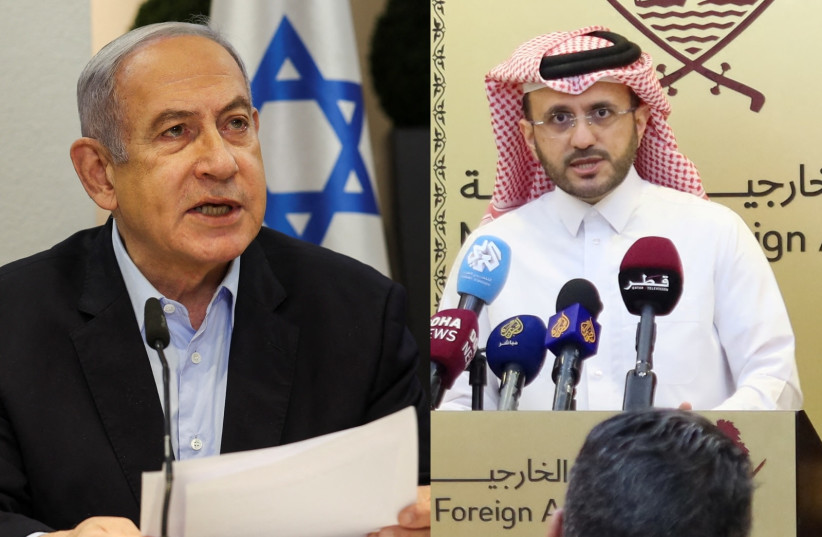US, European, and Middle Eastern officials have been sending out messages recently suggesting that there may be a path to establish a Palestinian state as part of a larger peace deal between Israel and the Palestinians.
For more stories from The Media Line go to themedialine.org
US Secretary of State Antony Blinken was among those voicing the White House’s wish for Palestinian statehood recently, saying that he had been working on “a practical, time-bound, irreversible path to a Palestinian state living side-by-side in peace with Israel.”
US President Joe Biden has also spoken about working “toward a two-state solution.” Both French Prime Minister Emmanuel Macron and former British Prime Minister David Cameron have also spoken of a “horizon” leading to a two-state solution.
The Washington Post reported last week that talks involving the US, Jordan, Saudi Arabia, the United Arab Emirates, and Palestinian representatives were proposing a three-stage truce, which in the first stage would involve a six-week cease-fire during which Hamas would release the over 100 Israeli hostages it is holding.
This would give the sides time and space to garner support, hold meetings, and even see the formation of an interim Palestinian government, the report said.
In response to such reports, Israel’s government on Sunday firmly rejected any international attempts to impose recognition of a Palestinian state on Israel, saying that any permanent settlement with the Palestinians would come about only through direct negotiations between the sides.

“Israel utterly rejects international decrees regarding a permanent settlement with the Palestinians,” the cabinet said in a statement.
“A settlement, if it is to be reached, will come about solely through direct negotiations between the parties, without preconditions. Israel will continue to oppose unilateral recognition of a Palestinian state. Such recognition in the wake of the October 7th massacre would be a massive and unprecedented reward to terrorism and would foil any future peace settlement.”
US still holds out hope for statehood, but Palestinians doubt its resolve to actualize a plan
Prof. Jonathan Rynhold of Bar-Ilan University’s Department of Political Studies told The Media Line that the US wants the stalled peace process to be revived.
“The US is very serious that there needs to be a horizon for a two-state solution that is realistic, but it doesn’t expect, nor will it apply very heavy pressure, for the setting up of a Palestinian state with full sovereignty in the near future, because they don’t want it to be a failed state,” he said.
Rynhold said the US had several motives behind the recent push.
“First, they have international strategic objectives, and that is if Israel succeeds in bringing the Hamas regime in Gaza down, there will be a great opportunity to put something much more constructive in its place. [The new entity to replace Hamas must be] constructive for the Palestinian well-being, as they are focused on rebuilding the economy and society,” Rynhold said.
He says this could be the best time for a chance to bring all sides closer, as the parties involved don't want to miss this opportunity.
"I think that they mean the diplomatic horizon of a two-state solution to get the Gulf states buy-in to help fund it, and to gain Arab and Muslim legitimacy [support]. And the hope that the offer of normalization with Saudi Arabia will allow a different Israeli government, because it won't be this one, to make some moves that allow that horizon to be credible," said Rynhold.
Rynhold said it was being hoped that the offer of normalization of Saudi relations with Israel would help sway the Israeli government toward accepting a Palestinian state.
“The hope is that the offer of normalization with Saudi Arabia will allow a different Israeli government, because it won’t be this one, to make some moves that allow that horizon to be credible,” Rynhold said.
“You need a different Israeli government; you need a Palestinian leadership that has the confidence of the international community ... and the Palestinian Authority to run Gaza.”
However, Ramallah-based political analyst Nihad Abu Ghosh told The Media Line that he doubted the seriousness of the US on the issue.
“Nothing proves that there is seriousness. Seriousness is coupled with other actions and not just verbal talk about the two-state solution,” he said.
Abu Ghosh said that any movement “must also be linked to stopping the Israeli aggression, stopping the war of extermination, stopping displacement, stopping settler violence, and stopping absolute support for Israel despite the genocidal crimes it is committing.”
He says that this is not the first time that Washington has made positive-sounding comments on the Palestinian cause.
“We have heard that before, from all the American administrations in the White House, starting with George H.W. Bush, then passing through [Bill] Clinton, then George W. Bush, then [Barack] Obama, then [Donald] Trump, and now Biden. They all talked about a Palestinian state. But none of them tried to translate this into practical reality,” Abu Ghosh said.
He said a plan could only succeed “if it is consistent with the rights of the Palestinian people and their minimum national rights.”
US clarified that statehood cannot come from unilateral recognition
Speaking Sunday night at a Jerusalem conference of US Jewish leaders, US Ambassador Jack Lew played down talk that the US could recognize a Palestinian state unilaterally.
“We have never said there should be a unilateral recognition of a Palestinian state,” he said.
Instead, he called for an “over-the-horizon process that includes a vision for a demilitarized Palestinian state.”
He said there was now “a real possibility that by engaging in normalization and negotiations with Saudi Arabia,” along with reforms in the Palestinian Authority, “there can be a demilitarized Palestinian state. But Israel will have to make that choice.”
